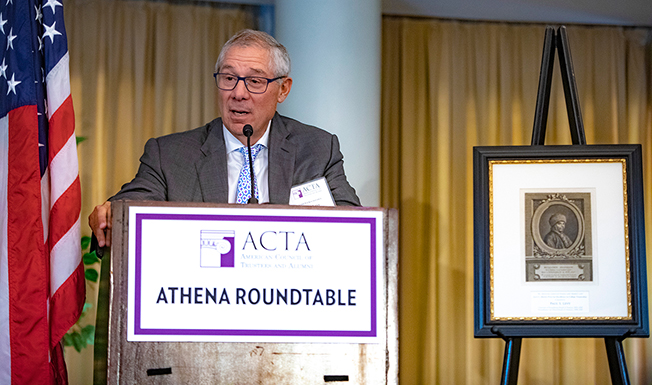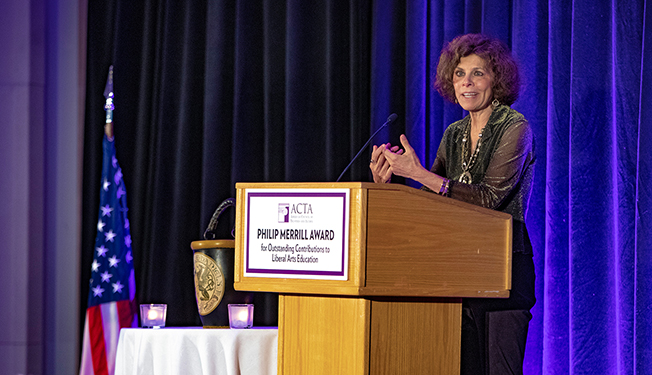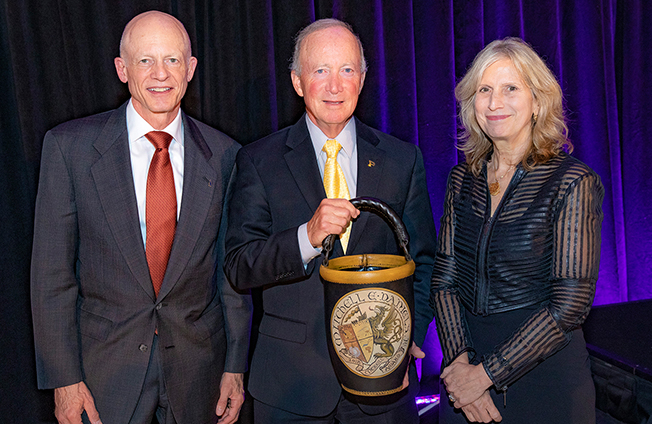ACTA in the NewsDonor Intent
The Next Step for Disaffected Donors
Americans’ confidence in our higher education system is at a historic low. According to a Gallup poll this summer, only 36 percent have real...
Over the last year, higher education has continued to garner national attention. Controversial speakers, college closures, exorbitant tuition costs, athletics scandals, and lack of career preparation have all caused the public to call American higher education into question. Despite these daunting problems, beacons of innovative and strong leadership have demonstrated that renewal is possible.

This year’s ATHENA conference, “First Principles in Higher Education Leadership: Protecting Freedom, Safeguarding Value,” drew a distinguished audience of over 130 faculty, college presidents, trustees, students, and alumni for engaging discussions on restoring American higher education as the finest in the world.
The morning panel on academic freedom sparked energetic dialogue between our audience and panelists. The discussion, moderated by Jonathan Rauch, senior fellow at The Brookings Institution and contributing editor to The Atlantic, featured panelists from diverse backgrounds who ardently defend freedom of expression.

From left to right: Nadine Strossen, Paul Levy, Eugene Volokh, April Lawson, and Jonathan Rauch
Nadine Strossen, author of Hate: Why We Should Resist It with Free Speech, Not Censorship, identified colleges and universities as crucial platforms for defending free speech and promoting thoughtful debate. Paul Levy described his principled stand of resigning from the board of trustees at the University of Pennsylvania in defense of a colleague’s constitutional right to free speech.
UCLA Law Professor Eugene Volokh encouraged institutions to host debates with experts of different viewpoints. And April Lawson of Better Angels—a nationwide depolarization initiative—remarked that young people want to participate in robust debates and encouraged institutions to provide more opportunities for civil intellectual exchanges.
College debt now stands at over $1.5 trillion; record-level tuition costs are leaving students with burgeoning debt and no guarantee of a quality education. Our second panel on controlling costs addressed these challenges in a deeply informative and compelling conversation moderated by Wall Street Journal reporter Douglas Belkin.
ACTA’s Vice President for Trustee & Government Affairs Armand Alacbay introduced our groundbreaking new website initiative—the Project on Administrative Costs—which will provide trustees and college leaders with access to a wealth of data about their institutions and help empower them to make education more affordable and cost-effective for students. The Honorable Hank Brown, former U.S. Senator and president emeritus of the University of Colorado, emphasized the importance of effective management, insisting that university leaders need to ask the tough questions in order to control costs, improve academic standards, and achieve better graduation outcomes.
Jan Sullivan, former chair of the board of regents at the University of Hawaii, advised public institutions to be more transparent in the decision-making process, especially regarding tuition increases, in order to remain accountable to the public. And Arizona State University Provost Mark Searle covered in great detail the success of the University’s efforts to cut costs and the robust financial aid they provide to in-state students.

From left to right: Armand Alacbay, Mark Searle, Jan Sullivan, The Honorable Hank Brown, and Doug Belkin
 Professor Philip Hamburger of Columbia Law School gave a heartfelt tribute to former University of Pennsylvania trustee Paul Levy (pictured left), who resigned earlier this year in response to the university’s treatment of Penn Professor Amy Wax, making a strong defense of academic freedom.
Professor Philip Hamburger of Columbia Law School gave a heartfelt tribute to former University of Pennsylvania trustee Paul Levy (pictured left), who resigned earlier this year in response to the university’s treatment of Penn Professor Amy Wax, making a strong defense of academic freedom.
Mr. Levy graciously accepted the Jerry L. Martin Prize and praised ACTA for defending the freedom of expression on campus and in our society.
To conclude the ATHENA Roundtable, our third panel brought together philanthropic experts to explore the direction and impact of major gifts in higher education. The panel was moderated by Janet Lorin, higher education reporter for Bloomberg News. Dr. Jacqueline Pfeffer Merrill, executive director of the Fund for Academic Renewal (FAR), emphasized the many opportunities to provide financial gifts to worthy academic programs. Andy Carroll, senior program director at Exponent Philanthropy, and Erin Hogan, managing director and philanthropic market executive at U.S. Trust, Bank of America Private Wealth Management, discussed the importance of transparency between institutions and donors to achieve the intended goals of a gift. Elizabeth Kaufer Busch, co-director of the Center for American Studies at Christopher Newport University, encouraged institutions to communicate clearly to donors how their gifts will be used.

From left to right: Jacqueline Pfeffer Merrill, Elizbaeth Kaufer Busch, Andy Carroll, Erin Hogan, and Janet Lorin
Each year, ACTA presents the Philip Merrill Award for Outstanding Contributions to Liberal Arts Education to courageous leaders who have inspired change in higher education. Former governor of Indiana and Purdue President Mitchell E. Daniels, Jr., was this year’s worthy recipient.

Charles Murray, Erskine Bowles, Jeb Bush, and Nadine Strossen (pictured left) gave passionate tributes to Mr. Daniels for his extraordinary accomplishments since taking the helm at Purdue in 2013. President Daniels was lauded for his work to freeze tuition at Purdue for seven consecutive years, and to defend freedom of expression on campus.
In his acceptance speech, President Daniels offered heartfelt appreciation to all of his tribute-givers and praised ACTA’s work as “essential to the future of higher education.” He described his firm commitment to non-negotiable free speech policies, including the adoption of the Chicago Principles, and stressed that while Purdue is well-known for its STEM programs, the study of the liberal arts is the foundation of an excellent university education. President Daniels also emphasized Purdue’s growing focus on providing STEM majors with liberal arts training though the two-year Cornerstone program, ensuring that all students receive a well-rounded education that provides them with the skills to contribute meaningfully in both career and civic life.

From left to right: ACTA President Michael Poliakoff, The Honorable Mitchell E. Daniels Jr. and Mrs. Cheri Daniels
This year’s ATHENA Roundtable and Merrill Award Gala attracted a record attendance of education leaders eager to learn and explore ways to ensure that American higher education remains the finest in the world. Thank you to all of our attendees and donors that made this event so successful.
Americans’ confidence in our higher education system is at a historic low. According to a Gallup poll this summer, only 36 percent have real...
Launched in 1995, we are the only organization that works with alumni, donors, trustees, and education leaders across the United States to support liberal arts education, uphold high academic standards, safeguard the free exchange of ideas on campus, and ensure that the next generation receives an intellectually rich, high-quality college education at an affordable price.
Discover MoreSign up to receive updates on the most pressing issues facing our college campuses.